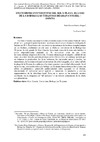Identificador persistente para citar o vincular este elemento:
https://accedacris.ulpgc.es/jspui/handle/10553/71189
| Campo DC | Valor | idioma |
|---|---|---|
| dc.contributor.author | Moreira Gregori, Pedro Ernesto | en_US |
| dc.contributor.author | Guedes Pérez, Eva | en_US |
| dc.date.accessioned | 2020-04-01T14:17:50Z | - |
| dc.date.available | 2020-04-01T14:17:50Z | - |
| dc.date.issued | 2016 | en_US |
| dc.identifier.issn | 2386-8570 | en_US |
| dc.identifier.other | Dialnet | - |
| dc.identifier.uri | https://accedacris.ulpgc.es/handle/10553/71189 | - |
| dc.description.abstract | Las Islas Canarias son mundialmente conocidas como destino consolidado de “sol y playa” y al igual que España han batido los récords históricos en el número de llegada de turistas en 2015. En el marco de una creciente importancia de la oferta complementaria en los destinos, analizamos en este caso la oferta de enoturismo de la Bodega Las Tirajanas: la más grande de Gran Canaria. Localizada cerca de la zona más turística y como emprendimiento conjunto de 16 viticultores unen en sus vinos las características singulares de la isla. Canarias destacan por la singular calidad de sus vinos los cuales han ido ganando prestigio en los últimos años, sin embargo no tanto por su volumen de producción. La tierra volcánica, las variedades únicas y locales, los microclimas, la vendimia artesanal en un terreno de difícil orografía, el no haber sufrido la plaga de la filoxera, le confieren a los vinos canarios una calidad diferenciada. En el marco de una producción selecta, la bodega Las Tirajanas busca ofrecer a los turistas una oferta complementaria generando paulatinamente valor agregado en el destino, dinamizando el tradicional sector agrícola e innovando en productos y eventos representativos de la viticultura local. Todo en el marco de un mercado turístico cambiante tras la irrupción del “all inclusive” y un relativo retraimiento de la oferta complementaria. | en_US |
| dc.description.abstract | The Canary Islands are worldwide known as a consolidated destination of “sun and beach” and as Spain they have beaten the historical records in the number of tourists' arrivals in 2015. In the context of an increasing importance of the complementary offer in tourist destinations, we analyze in this case the offer of wine tourism of the winery Las Tirajanas: the largest one of Gran Canaria. Located close to the most tourist area and formed by the union of 16 wine growers with vineyards located in very different areas of the island. The Canary Islands are notable for the unique quality of its wines which have been gaining prestige in recent years. However not so much by its production volume. The volcanic soil, the unique and local varieties, the different microclimates, the handmade grape harvest in an area of difficult terrain and not having suffered the plague of phylloxera, give to the canarian wines a differentiated quality. Within the framework of a select production, Las Tirajanas winery seeks to offer the tourists a complementary offer gradually generating added value in the destination, energising the traditional agricultural sector and innovating in products and events representative of the local viticulture. Everything in the framework of a tourist market changing after the irruption of “all inclusive” and a relative contraction of the complementary offer. | en_US |
| dc.language | spa | en_US |
| dc.relation.ispartof | International journal of scientific management and tourism | en_US |
| dc.source | International journal of scientific management and tourism [ISSN 2386-8570],v. 2 (3), p. 205-224 | en_US |
| dc.subject | 531290 Economía sectorial: turismo | en_US |
| dc.subject.other | Enoturismo | en_US |
| dc.subject.other | Bodega las tirajanas | en_US |
| dc.subject.other | Gran Canaria | en_US |
| dc.title | Enoturismo en un destino del sol y playa: El caso de la bodega las tirajanas de Gran Canaria – España | en_US |
| dc.type | info:eu-repo/semantics/Article | en_US |
| dc.type | Article | en_US |
| dc.identifier.url | http://dialnet.unirioja.es/servlet/articulo?codigo=5665946 | - |
| dc.description.lastpage | 224 | - |
| dc.identifier.issue | 3 | - |
| dc.description.firstpage | 205 | - |
| dc.relation.volume | 2 | - |
| dc.investigacion | Ciencias Sociales y Jurídicas | en_US |
| dc.type2 | Artículo | en_US |
| dc.contributor.authordialnetid | 3411785 | - |
| dc.contributor.authordialnetid | No ID | - |
| dc.identifier.dialnet | 5665946ARTREV | - |
| dc.utils.revision | Sí | en_US |
| dc.identifier.ulpgc | Sí | es |
| dc.description.dialnetimpact | 0,0 | |
| dc.description.dialnetq | Q3 | |
| dc.description.dialnetd | D6 | |
| item.grantfulltext | open | - |
| item.fulltext | Con texto completo | - |
| crisitem.author.dept | GIR TIDES: Investigación en Turismo y Transporte | - |
| crisitem.author.dept | IU de Turismo y Desarrollo Económico Sostenible | - |
| crisitem.author.dept | Departamento de Psicología, Sociología y Trabajo Social | - |
| crisitem.author.orcid | 0000-0003-1985-5394 | - |
| crisitem.author.parentorg | IU de Turismo y Desarrollo Económico Sostenible | - |
| crisitem.author.fullName | Moreira Gregori, Pedro Ernesto | - |
| Colección: | Artículos | |
Visitas 5
435
actualizado el 15-ene-2026
Descargas
176
actualizado el 15-ene-2026
Google ScholarTM
Verifica
Comparte
Exporta metadatos
Los elementos en ULPGC accedaCRIS están protegidos por derechos de autor con todos los derechos reservados, a menos que se indique lo contrario.
